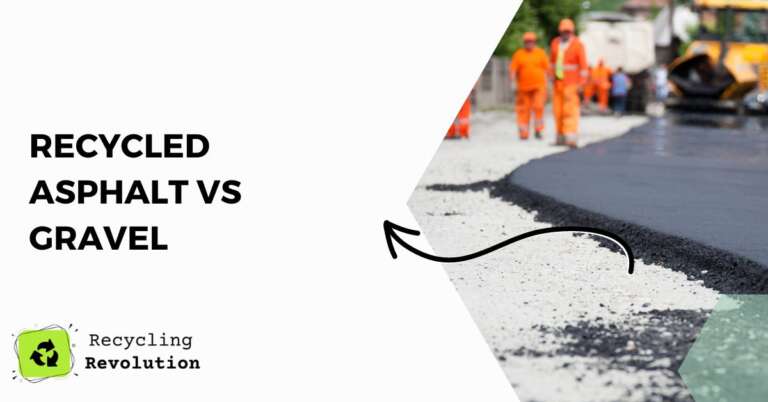Recycled asphalt and gravel are two popular materials used for a range of projects, from driveway construction to road repairs. As an authority on the topic, I’ve compiled a comprehensive guide to help you understand their characteristics, benefits, drawbacks, and suitable applications.
This guide will give you valuable insights, helping you make an informed decision when choosing between recycled asphalt and gravel.
TL;DR: If you’re in a hurry, here’s a quick rundown. Recycled asphalt offers greater durability, a smoother finish, and better ecological friendliness due to its recyclable nature. Gravel, on the other hand, tends to be cheaper and provides a more rustic aesthetic. However, each material has its place, and the best choice depends on the specifics of your project.
What is Recycled Asphalt
Recycled asphalt, also known as reclaimed asphalt pavement (RAP), is derived from existing asphalt material that has been milled off during resurfacing projects or excavated from asphalt demolition sites.
Benefits of Recycled Asphalt
There are numerous benefits to using recycled asphalt:
- Durability: One of the greatest benefits of recycled asphalt is its durability. It tends to hold up better to wear and tear, including heavy vehicle traffic and harsh weather conditions.
- Smoothness: Once compacted, recycled asphalt creates a smoother surface, which can be desirable for certain applications like driveways and roads.
- Environmental Friendliness: As a recyclable material, using recycled asphalt is more environmentally friendly. It helps reduce landfill waste and decrease the need for virgin asphalt material.
Drawbacks of Recycled Asphalt
Despite its benefits, recycled asphalt also has some drawbacks:
- Cost: Recycled asphalt can be more expensive than gravel, which can be a deciding factor for budget-sensitive projects.
- Availability: Depending on your location, recycled asphalt may not be as readily available as gravel.
Gravel
Gravel is a commonly used material, often chosen for its cost-effectiveness and ease of installation.
Benefits of Gravel
Gravel brings a few advantages:
- Cost: Gravel is generally less expensive than recycled asphalt. For larger projects, this cost difference can be significant.
- Aesthetics: For some, the rustic, natural look of gravel is more appealing than the uniform appearance of asphalt.
- Easy to Install: Gravel is relatively easy to install and maintain, making it a popular choice for many DIY enthusiasts.
Drawbacks of Gravel
However, gravel has its downsides:
- Durability: Gravel is not as durable as asphalt and will need to be replenished more frequently.
- Roughness: Gravel provides a rougher surface, which may not be suitable for all applications.
| Aspect | Recycled Asphalt | Gravel |
|---|---|---|
| Durability | High | Moderate |
| Cost | Higher | Lower |
| Environmental Impact | Lower | Higher |
| Surface | Smooth | Rough |
| Availability | Depends on location | Widely available |
Considerations for Choosing Between Recycled Asphalt and Gravel
When choosing between these two materials, consider your project’s needs and priorities. If durability and smoothness are key, I recommend recycled asphalt. However, if budget and rustic aesthetics are more important, gravel may be the better choice.
The Recycling Process of Asphalt
Understanding the recycling process of asphalt can give you a clearer picture of why recycled asphalt can be a more expensive option compared to gravel. Asphalt is a 100% recyclable material that undergoes a meticulous recycling process:
- Asphalt Milling: The first step is to mill off the asphalt surface of roads, driveways, or parking lots. This is usually done when these surfaces need a resurface.
- Asphalt Collection: The milled asphalt is collected and transported to a recycling plant.
- Size Reduction: At the recycling plant, the asphalt is crushed and screened to achieve a consistent size, making it suitable for reuse.
- Quality Inspection: The quality of the recycled asphalt is inspected to ensure it meets the necessary specifications.
- Reuse: Once approved, the recycled asphalt is ready to be reused in various applications, such as new road projects or driveway installations.
Given this extensive process, it’s understandable why recycled asphalt may be priced higher than gravel, which involves a more straightforward extraction process.
Maintenance Considerations
Beyond the initial installation, the ongoing maintenance requirements of recycled asphalt and gravel can also influence your decision:
- Recycled Asphalt: Recycled asphalt is low-maintenance compared to gravel. Once it’s laid down and compacted, it can endure for many years with little to no maintenance. It is also less prone to developing potholes or washboard ruts commonly seen in gravel driveways or roads.
- Gravel: Gravel requires more maintenance. Over time, traffic can cause the stones to spread, requiring regular raking to keep the surface level. Gravel also has a tendency to sink into mud in wet conditions, and weed growth is another common issue.
Environmental Impact and Sustainability
While we’ve touched on the environmental benefits of recycled asphalt, it’s worth delving a bit deeper. The process of recycling asphalt significantly reduces the carbon footprint of road construction by reusing the existing asphalt.
This reduces the demand for new asphalt material, which in turn reduces the amount of oil needed (as asphalt is a petroleum product).
Gravel extraction, on the other hand, often involves mining from riverbeds or quarries, which can have a more significant environmental impact, including habitat destruction, water pollution, and soil erosion.
Practical Applications
The type of project you’re planning can also determine whether recycled asphalt or gravel is the right choice:
- Driveways: Recycled asphalt can provide a smooth, solid, and low-dust surface that’s ideal for driveways. However, if you prefer a more rustic, country-style look, gravel could be a fitting choice.
- Walking Paths: For walking paths, gravel often provides an appealing, natural aesthetic, whereas recycled asphalt provides a smoother surface, which may be better for those with mobility issues.
- Roadways: For roadway construction, recycled asphalt is often favored due to its durability and resilience to heavy traffic. However, in rural or less trafficked areas, gravel can be a cost-effective alternative.
When making a choice, I recommend considering the unique requirements of your project and balance these against the costs and the aesthetic appeal of each material.
Installation Tips
Both recycled asphalt and gravel have straightforward installation processes, but here are a few tips that might be helpful:
- Prepare the Surface: For both materials, start by clearing the area of any debris and ensure the ground is level.
- Consider a Weed Barrier: For gravel paths or driveways, laying down a weed barrier before the gravel can help reduce weed growth.
- Consider a Gravel Base: If you’re opting for recycled asphalt, you could lay a gravel base for additional stability.
Note: For larger projects or if you’re inexperienced, it might be best to hire a professional to ensure the installation is done correctly. Incorrect installation can lead to problems down the line, such as pooling water or uneven surfaces.
With these insights, you’ll be well-equipped to make an informed decision on whether to use recycled asphalt or gravel for your next project.
Alternatives to Consider
In addition to recycled asphalt and gravel, you might want to consider other alternatives like concrete or pavers. These materials offer different aesthetics and durability levels, and may be more suitable for certain projects.
Conclusion
In choosing between recycled asphalt and gravel for construction projects such as driveways, roads, or walking paths, a thorough consideration of the project’s specific needs, preferences, and budget is essential. Recycled asphalt offers advantages like greater durability, smoothness, and an environmentally friendly nature, but it might come with a higher cost and may be less available in some locations.
Gravel, on the other hand, presents a cost-effective, rustic option, yet it lacks the durability and smooth finish of recycled asphalt. Understanding the extensive recycling process of asphalt and the associated ecological benefits can provide further insights into this decision-making process.
Maintenance considerations, practical applications, and professional installation may also influence the choice. In the end, the decision between recycled asphalt and gravel isn’t a one-size-fits-all answer but should be tailored to the unique requirements, aesthetics, cost considerations, and environmental impact of each project.
Other alternatives like concrete or pavers may also be explored to find the best solution for your specific situation.
FAQs
Is recycled asphalt more expensive than gravel?
A: Generally, yes. Recycled asphalt tends to be more expensive than gravel. However, it’s worth noting that prices can vary based on your location and the scope of your project.
Can I use both recycled asphalt and gravel in the same project?
A: Absolutely! In fact, many people use a gravel base with a recycled asphalt top layer for a balance of cost-effectiveness and durability.
Note: Always consider your project’s specific needs and consult with a local professional for the best results.

